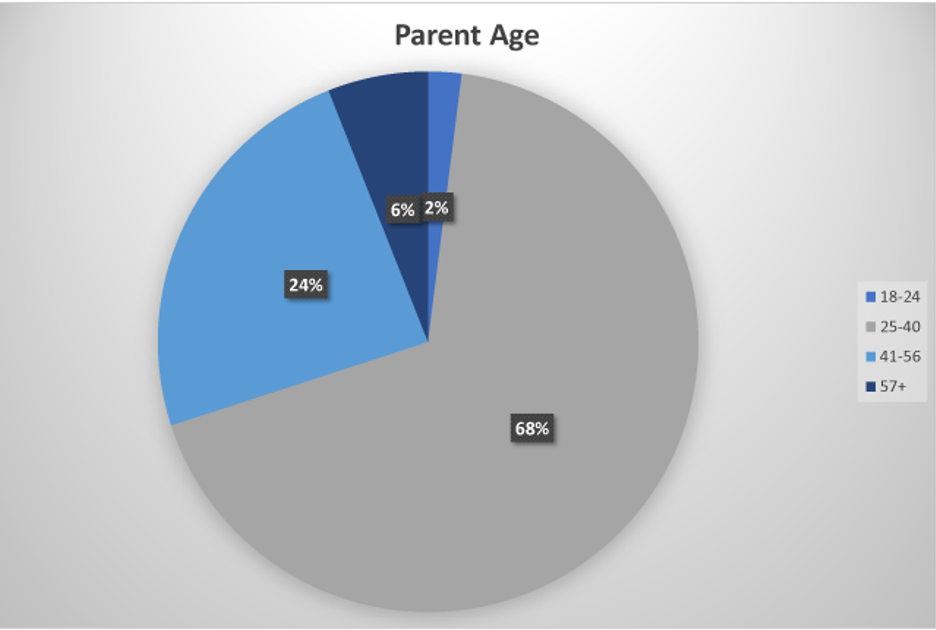The Generational Divide in Digital Parenting Styles – Millennial Parents vs. Gen-X Parents
Understanding Digital Parenting – Survey Background
In August 2021, Smith Micro surveyed 2,000 American parents of school-age kids to learn more about the digital parenting tools and approaches they use to manage screen time, digital content consumption, and connected device usage. We analyzed the results by parent ages, splitting the survey pool into four groups: parents aged 18-24, parents aged 25-40, parents aged 41-56, and parents 57 years or older.

The analysis provided below compares survey responses from the two largest subsets – Millennial parents (ages 25 – 40) and Gen X parents (ages 41 – 56).
Q. What rules/techniques do you use to regulate your child’s online activity? [Select all that apply]
Millennial parents are much more likely to employ proactive digital parenting techniques than Gen X parents. Some examples, ordered in terms of cohort differential, include:
- Family Media Plan – 47% of Millennial parents use a family media plan to personalize guidelines on the screen time and media consumption of their kids vs. only 29% of Gen X parents.
- Designated screen-free times/zones – 40% of Millennial parents designate specific times of the day and areas of their house as “screen-free” zones, while only 25% of Gen X parents do so.
- Digital Content Filters – 42% of Millennial parents use digital content filters to block inappropriate websites & app downloads vs. only 28% of Gen X parents.
- Digital Rewards – 33% of Millennial parents use digital rewards – such as more screen time or a later bedtime – to incentivize their kids while only 19% of Gen X parents use this technique.
- Daily screen time limits – This digital parenting technique was the most popular with Gen-X parents, with 39% saying they used time limits to restrict the daily screen time their kids consume. A slightly greater proportion (46%) of millennial parents said they use daily screen time limits.
Perhaps the most interesting age-based takeaway from this question is:
- More than 1 out of 5 (22%) Gen-X parents surveyed said they do nothing in particular to regulate their child’s online activity. Only 8% of Millennial parents selected this option. *
*Note: If a respondent selected “N/A; I do not regulate my child’s online activity or use any particular rules/techniques” they were not able to select any other option in response to this question.
Digital Parenting Hot Topics
Again, analysis of responses to this question support the narrative that younger parents (ages 25 – 40) are much more proactive/concerned than middle-aged parents (ages 41 – 56) when it comes to the digital technology usage and internet safety of their kids. (Examples ranked in terms of percentage differential between age groups)
Q. Which of the following topics cause frequent arguments or disagreements when you discuss them with your child? [Select all that apply]
- Their online activity – 53% of Millennial parents said this topic causes frequent arguments with their kids, while just 36% of Gen X parents said the same.
- None of the above – Like the first question analyzed, Gen X parents are much more likely than millennial parents to select none of the listed options besides “None of the above”. 23% of Gen X parents surveyed selected this option, while just 9% of Millennial parents did the same. *
- Their privacy online – 36% of younger parents have frequent arguments with their children about their privacy online, while less than a quarter (23%) of Gen X parents identified privacy as a contentious topic.
- Their smartphone usage – Nearly half (45%) of Millennial parents frequently argue with their kids about their smartphone usage, while about a third (35%) of middle-aged parents do the same
- How much time they spend online – This was an area of agreement across all age groups. Nearly 57% of Millennial parents identified “screen time” as a common catalyst for arguments with their kids, while 48% of Gen X parents surveyed also selected this option.
- Who they’re speaking to online – Interestingly, this was the only option (besides “None of the above”) that Gen X parents selected with greater frequency that Millennial parents, with 19% of Gen X parents choosing this option compared to 16% of Millennial parents.
*Note: If a respondent selected “None of the above” they were not able to select any other option in response to this question.
Parental Approaches to Internet Safety Education
Q. How have you tried to help your child understand the dangers inherent to digital technology usage? [Select all that apply]
When analyzed by age of parent, the responses to this question follow a pattern similar to what we saw above with Millennial parents exhibiting more proactive digital parenting traits than parents in the Gen X cohort. (Examples ranked in terms of percentage differential between age groups)
- Having them talk to a family member or friend about their digital mistakes and the consequences – 46% of Millennial parents surveyed employ this tactic, while 31% of Gen X parents do the same.
- Scare tactics and/or sharing internet “horror stories” with them – 46% of Millennial parents selected this option, while 32% of Gen X parents surveyed use scare tactics to help their child understand the dangers of the internet.
- N/A; I have not done anything in particular – Based on the previous two questions analyzed , the results here aren’t surprising. 22% of Gen X parents say they do nothing in particular, while just 8% of Millennial parents say the same. *
- Personal stories/anecdotes – This was the most popular option across both cohorts with 53% of Millennial parents and 42% of Gen X parents employing this tactic.
- Sharing educational tools/content with them – Slightly more than half (51%) of Millennial parents employ this tactic while 41% of Gen X parents do the same.
- Sending them to therapy – While this was the most drastic digital parenting approach on the list, about one of every seven (15%) parents in the Millennial cohort admitted to using it while slightly less than one in ten (9%) of Gen X parents said the same.
*Note: If a respondent selected “N/A; I have not done anything in particular” they were not able to select any other option in response to this question.
Digital Parenting Key Takeaways
Millennial parents (ages 25-40) take a much more proactive approach to digital parenting than do their older peers in the Gen X cohort (ages 41 – 56). Gen X parents are nearly 3X more likely than Millennial parents to say they do nothing in particular in terms of digital parenting or online safety education.
In terms of consumer interest in digital parenting services and technology – such as parental controls software, digital content filters, and screen time management tools – our survey data indicates that Millennial parents are the core demographic to target in the family services market. Not only do these younger parents place more importance on digital parenting issues, their kids will be, on average, younger than kids raised by Gen Xers meaning that family safety services are relevant (and worth paying for) for a longer period of time.
To continue exploring our Understanding Digital Parenting survey, download this eBook.



